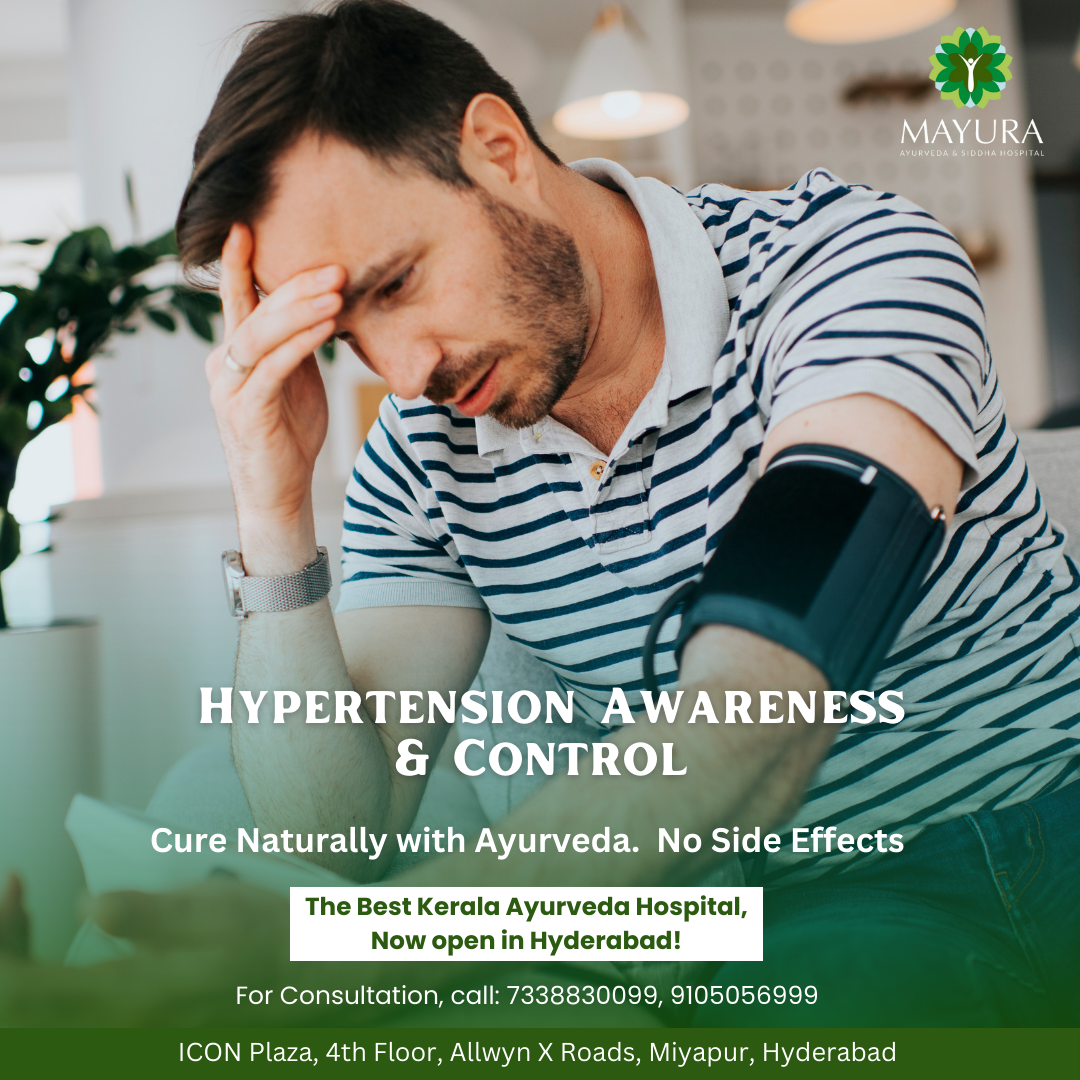Hypertension, also known as high blood pressure, is a growing health concern worldwide. Often dubbed the “silent killer” due to its lack of prominent symptoms, it can silently damage your heart, arteries, kidneys, and other vital organs. Early detection and management are crucial to prevent severe consequences like heart attack, stroke, and kidney failure.
Mayura Ayurveda & Siddha Hospital is dedicated to empowering individuals with knowledge and natural approaches to manage hypertension. This blog post sheds light on hypertension, its causes, risks, and how Ayurveda and Siddha can complement conventional medicine in achieving optimal blood pressure control.
Understanding Hypertension: The Numbers Game
Blood pressure is measured in two values: systolic and diastolic. Systolic pressure represents the force exerted by blood against the artery walls as the heart beats. Diastolic pressure indicates the pressure between heartbeats when the heart relaxes. Normal blood pressure falls within the range of less than 120/80 mmHg. Hypertension is categorized as:
Elevated: Systolic pressure between 120-129 mmHg and diastolic pressure less than 80 mmHg.
Stage 1 Hypertension: Systolic pressure between 130-139 mmHg or diastolic pressure between 80-89 mmHg.
Stage 2 Hypertension: Systolic pressure 140 mmHg or higher or diastolic pressure 90 mmHg or higher.
What Causes High Blood Pressure?
The exact cause of hypertension remains unknown in many cases (primary hypertension). However, several factors can contribute to its development:
Unhealthy Lifestyle: Diet high in sodium, saturated fats, and processed foods, coupled with physical inactivity and excessive alcohol consumption, are significant risk factors.
Genetics: Family history of hypertension increases your susceptibility.
Underlying Medical Conditions: Chronic kidney disease, sleep apnea, and certain hormonal imbalances can contribute to high blood pressure.
Stress: Chronic stress can activate the body’s “fight-or-flight” response, leading to temporary or sustained blood pressure elevation.
Recognizing the Signs and Symptoms of Hypertension
Hypertension is often asymptomatic, making regular blood pressure checks crucial. However, some individuals with uncontrolled hypertension may experience:
Headaches, particularly in the morning
Difficulty breathing
Chest pain
Dizziness or lightheadedness
Blood in the urine (rare)
Changes in vision
The Dangers of Untreated Hypertension
Uncontrolled hypertension significantly increases your risk of developing life-threatening complications, including:
Heart Attack: High blood pressure weakens the heart muscle and arteries, making them more susceptible to blockage and heart attacks.
Stroke: When hypertension damages blood vessels in the brain, it can lead to a stroke, interrupting blood flow and causing brain cell death.
Kidney Disease: Hypertension can damage the delicate filtration system in the kidneys, leading to kidney failure.
Eye Damage: High blood pressure can damage blood vessels in the retina, leading to vision problems and even blindness.
Cognitive Decline: Chronic hypertension can contribute to cognitive decline and dementia.
The Ayurvedic and Siddha Approach to Hypertension Management
Mayura Ayurveda & Siddha Hospital believes in a holistic approach to managing hypertension. While conventional medication plays a vital role, Ayurvedic and Siddha principles can effectively complement it, promoting overall well-being and potentially reducing medication requirements. Let’s explore some key aspects:
Dietary Modifications: Ayurveda emphasizes a sattvic diet – whole, fresh, and easily digestible foods. Reducing salt intake, limiting processed foods, and incorporating herbs and spices like garlic, ginger, and cumin can be beneficial.
Herbal Remedies: Ayurvedic formulations like Triphala Guggulu and Arjuna Chhal have shown potential to support healthy blood pressure. Siddha medicine also utilizes herbal preparations like Nilavembu Kudineer and Punnaga Varthai for blood pressure management. However, it’s crucial to consult an Ayurvedic or Siddha physician for personalized recommendations.
Lifestyle Practices: Regular exercise, yoga, and meditation are vital for stress management and promoting overall cardiovascular health. Ayurveda also recommends practices like Shirodhara (pouring medicated oil on the forehead) and Abhyanga (oil massage) to promote relaxation and improve circulation.
Panchakarma: This intensive Ayurvedic detoxification process may be recommended in some cases to cleanse the body and eliminate accumulated toxins that can contribute to hypertension.
















